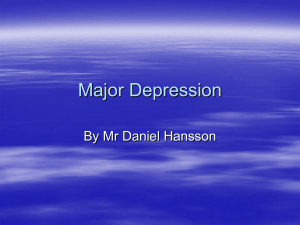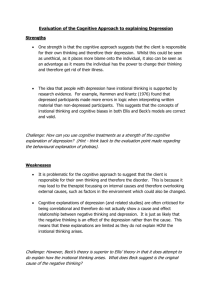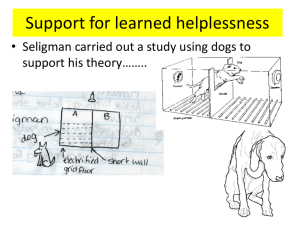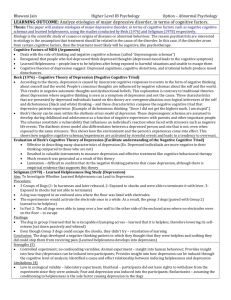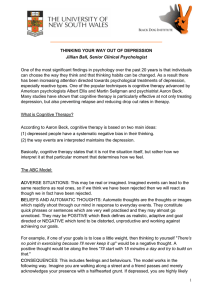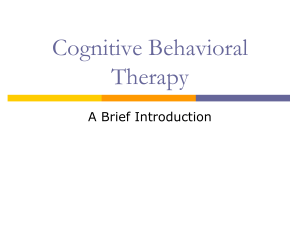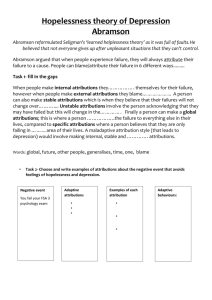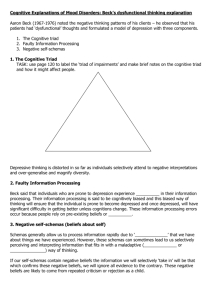Cognitive Etiology
advertisement
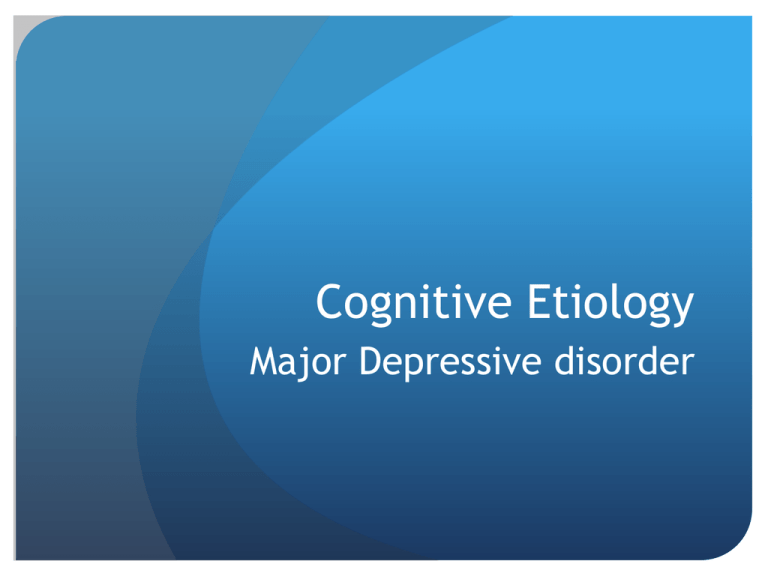
Cognitive Etiology Major Depressive disorder Key concept The way we think, influences the way we feel and therefore can cause mood disorders. What types of cognitions lead to major depressive disorder? Faulty attributions-”My boyfriend didn’t call me because he doesn’t love me” Cognitive distortions-”My life is terrible because I missed the bus this morning” Irrational beliefs-”My work must be perfect”. “My essay did not get a level 7, I must be stupid” Attributional Theory of Depression (Abramson et al 1978) Main Ideas: An attribution is an explanation of why something happens. Depression results from the types of attributions people make-the explanations they give their own behaviour and situation. Theory in detail Depressed people view failure in the following ways: Causes are internal (blaming themselves not the situation). Situations are stable (showing extreme pessimism about the future). Failure as global (not specific to one situation). In other words ‘its me, its going to last forever and everything I do will go wrong’. This type of attribution leads to feelings of helplessness thus depression. Evidence Metalsky et al 1987 Students who did badly on a Psychology exam. Two days after those that attributed their failure to internal, stable and global causes continued to be depressed. Students who made different attributions did not (I wasn’t feeling well, difficult etc). Evidence (+) Plausible and supported by a large body of evidence. (-) Does the attribution precede or follow depression? Most researchers believe it precedes it. Sexual abuse in childhood, overprotective parents and harsh discipline has all been linked. Rose et al 1994. (-) Evidence from humans is from college based laboratory experiments. Artificial and unrepresentative. (-) Much evidence comes from answers to the Attributional Style Questionnaire. Forces people into this kind of thinking. Aaron Beck’s 1967 cognitive theory of depression. The theory in general: Depressed people think differently about themselves and the world around them. They have a depressive way of viewing and representing the world. It is based on schema processing where stored schemas about the self interfere with information processing. Schemas influence the way people make sense of experiences. People have negative cognitive schemas-depressogenic schemas Specifically Seeing the self in negative terms can lead to errors in thinking. For example: Arbitrary inference- drawing conclusions without evidence, particularly about the self. Selective abstraction-forming conclusions from an isolated detail while ignoring contradictory evidence. Overgeneralizations-drawing conclusions from a particular event and applying it generally. Arbitrary Inference A person draws the wrong conclusioneven when there is no evidence to support these wrong conclusions Can you think of an example? Selective Abstraction A person focuses on small negative details and ignores the bigger picture Can you think of an example? Overgeneralisation A person draws global conclusions about himself/herself based on one single event Can you think of an example? The Negative Cognitive triad Negative thoughts and errors in thinking can produce a negative cognitive triangle. Negative view of: the self the world the future The Negative Cognitive Triad themselves negative views about: The world The future How do people form depressogenic schemas? Use p55 of the PDF study guide to find out Evidence Boury et al (2001) Lewinshohn et al (2001) Use p55 of the PDF study guide to outline the above studies: Evidence A prospective study Alloy et al (1999) Use p154 of the textbook: What is a prospective study? Aim Method Findings Evaluation of Beck (+) Supported by plenty of evidence. Research indicates that depressed people have more negative thoughts about themselves, the world and the future. They are more likely to make the errors identified. ( ?? ) Does negative thinking precede and contribute to the onset OR follow and maintain depression? What does the evidence tell us? Evaluation Do some independent research to find out what the Beck Depression Inventory is. Treatment If depression is caused by cognitive style, how should it be treated? More Evaluation Therapies based on the cognitive explanation have been very effective However, we have to be aware of the Treatment Etiology Fallacy. This when people assume that the success of a treatment reveals the cause of the disorder.
